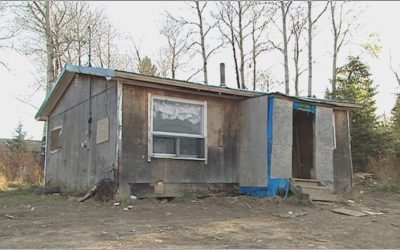“The best social program is a good job.” – Ronald Reagan and Bill Clinton.
Unemployment is notoriously higher among Canadian Aboriginal people than among the general population. Some observers emphasize the need for better government programs of education, job training, and counseling. Without discounting the role of government, we would point out that Aboriginal people can and do succeed on their own initiative.
One of many such success stories is furnished by the Cold Lake First Nations, who have taken advantage of opportunities furnished by oil sands and heavy oil development in their area. Resource companies recognize that it is in their own interest to develop an Aboriginal labour force close to where the work is, and so have made special provision for contracting with Aboriginal companies. The Cold Lake First Nations have made remarkable use of this opportunity.
James Blackman, a member of Cold Lake First Nations, took advantage of the service industry niche in Alberta’s oil sands by starting the Primco Dene Group of companies, 100% band owned. Blackman had two goals in mind—to create long-term, sustainable employment for the Aboriginal communities, and “to provide value and ensure sustained profitability for their shareholders through the provision of premium services optimizing industry standards and best practices.”
Primco Dene includes a catering company that provides food, janitorial, and maintenance services to oil camps; an emergency medical services company with 15 mobile treatment centres, 30 paramedics and two ambulances; a security company; a commercial branch providing retail space for development; Jiffy Lube and Wok Box franchises; the café in Casino Dene; and Seven Lakes Oilfield Services, providing well servicing, waste management, scaffolding services, insulating, vegetation control, and labour crews.
In addition to the Primco Dene Group of companies, Cold Lake First Nations employs community members through other successful First Nation companies such as Denchen, their local sawmill, and Casino Dene, which is building a new Casino Dene Resort Hotel and Conference Centre.
Beginning with only 50 employees, the Primco Dene Group has grown to approximately 650 employees, 500 of them Aboriginal. By recruiting from 50 different Aboriginal communities in Alberta, Saskatchewan, and British Columbia, those numbers are anticipated to climb to between 1500 and 2000 over the next few years.
Blackman credits the growth and success of Primco Dene and other companies to diversity, allowing employees to find their strengths among a variety of opportunities. Employees may try several jobs before finding one they prefer and succeed in. The results are satisfaction for both employee and employer, higher retention, and a foundation for future growth.
Several employment practices that differ from those of large non-Aboriginal employers also reduce the barriers to successful Aboriginal employment. One is the workplace policy on bereavement. Most non-Aboriginal workplace bereavement polices allow three or four bereavement days per year, per person, whereas Primco Dene is more flexible, reflecting the importance of funeral ceremonies in extended Aboriginal families.
Contrary to the practice of many employers, Primco Dene does not require Grade 12 completion for employment, yet has many successful employees who have demonstrated their abilities, resulting in journeyman completion and supervisory status.
A third difference lies in the requirement of a criminal records check, which can be a substantial barrier to Aboriginal employment. But does a past conviction, with time already served, and perhaps many years ago, have a bearing on who the person is today? Cold Lake First Nations employers believe it should not and their hiring practices reflect this belief.
Finally, in rural and remote areas, where public transportation is non-existent, providing transportation for workers is critical. Business manager John Darr has taken a proactive approach of complementing current stay-in-school education with driver’s education in Goodfish Lake and Cold Lake First Nations schools.
Because the Cold Lake companies know their employees personally and monitor performance closely, they can afford to dispense with some of the impersonal rules upon which large employers rely. As Thomas Sowell pointed out in his magisterial work Knowledge and Decisions, rules are not an end in themselves. They are a useful cost-saving device in situations where fine-grained knowledge is not available. Where detailed personal information is accessible, decision-makers can gain a comparative advantage by taking advantage of it, as the Cold Lake companies have done. The market, based on competition, allows employers to make best use of available information, whereas government regulation, which has to work through general rules, often stifles initiative.


